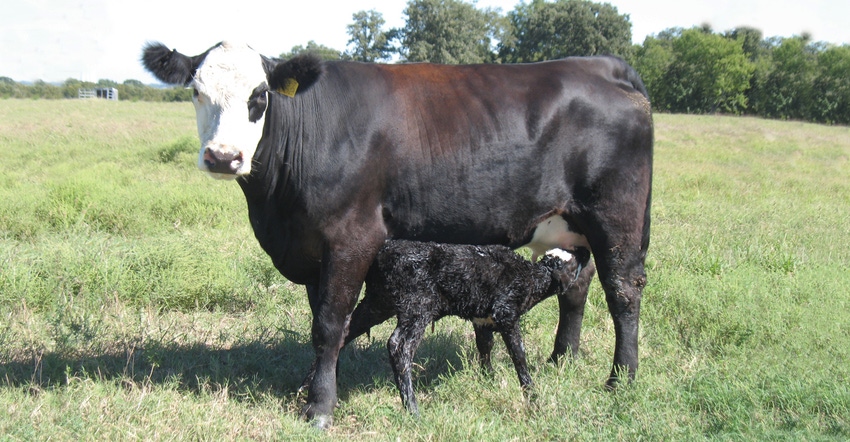A cow’s diet during the last third of her pregnancy is critical not only for calf development, but also for the creation of high quality colostrum. Give your calves the best start possible by placing cows and heifers on a high plane of nutrition during the last few months of pregnancy.
January 23, 2017

Sponsored Content
As a popular pizza chain states, better ingredients make all the difference. The same can be said for our cattle. We need to give them the proper nutritional building blocks to allow them to perform as desired. As we are heading toward calving season, we need to think about making sure that our cows have the best supplements to deliver the nutrients necessary to birth and rear a healthy calf.
A cow’s diet during the last third of her pregnancy is critical not only for calf development, but also for the creation of high quality colostrum. For first calf heifers, this last trimester is also critical for the development of mammary tissue that will affect her milk production for the rest of her life. To say that nutrition is crucial during the last third of pregnancy can’t be overstated!
Ingestion of colostrum (first milk) is necessary for the transfer of passive immunity to the calf. It is vital that calves receive colostrum within the first 24 hours of life in order to be able to effectively absorb these protective antibodies. Calves that receive adequate passive immunity transfer will experience benefits for the first 3 to 5 weeks of life. Failure of passive immunity transfer is a real issue and is documented to occur in roughly one third of dairy calves but is also an issue in beef calves even though not as well documented. Calves with inadequate immunity transfer are more susceptible to disease. Not only are these calves likely to have greater input costs due to medical treatment, but they are also at a greater risk of falling behind their contemporaries early and being culled down the road.
It is well known that all colostrum is not created equal. Multiple studies have shown differences in overall volume of colostrum as well as concentration of nutrients and antibodies known as immunoglobins. Immunoglobins, specifically IgG, are crucial for subsequent passive immunity. Calves need to receive a minimum amount of IgG to be fully protected. Colostrum that contains inadequate concentrations of IgG increases the risk of failure of passive immunity transfer. One key bit of information though, even if colostrum contains lower concentrations of IgG, calves can receive adequate IgG simply by consuming more. But the catch is that they must consume this higher volume of colostrum while the gut still has the ability to absorb the IgG. Immunoglobin transfer across the gut is optimum during the first 4 hours but then declines rapidly after 12 hours. Having lowered IgG concentrations increases the risk that calves might not consume adequate IgG within this window of time.
Research has demonstrated that supplementation with key trace minerals (copper, zinc, selenium), particularly organic forms, can positively influence IgG levels in colostrum. This makes perfect sense since these trace minerals are necessary components for the production of immunoglobins in the dam.
Transfer of immunoglobins from blood serum to the mammary glands begins roughly a month prior to calving and peaks a few days prior to birth. For this reason, it is critical for cows, especially first calf heifers, to be on a high plain of nutrition during those last few months of pregnancy.
While your cows and heifers should be on a high quality mineral supplement throughout their entire pregnancy, it is even more important during the last trimester. Supplementation with organic sources of trace minerals can be particularly beneficial at this time.
In summary, give your calves the best start possible by placing cows and heifers on a high plane of nutrition during the last few months of pregnancy. CRYSTALYX® Brand Supplements can help you achieve this goal with a wide variety of supplements, including the CRYSTALYX® Breed-Up® Supplements, designed for pre-calving through breeding.
Visit www.crystalyx.com to learn more or to download the CRYSTALYX® Body Condition Score app for free on your smart phone. This useful tool can help you monitor BCS as a measure of overall nutritional status in your herd.
About the Author(s)
You May Also Like



